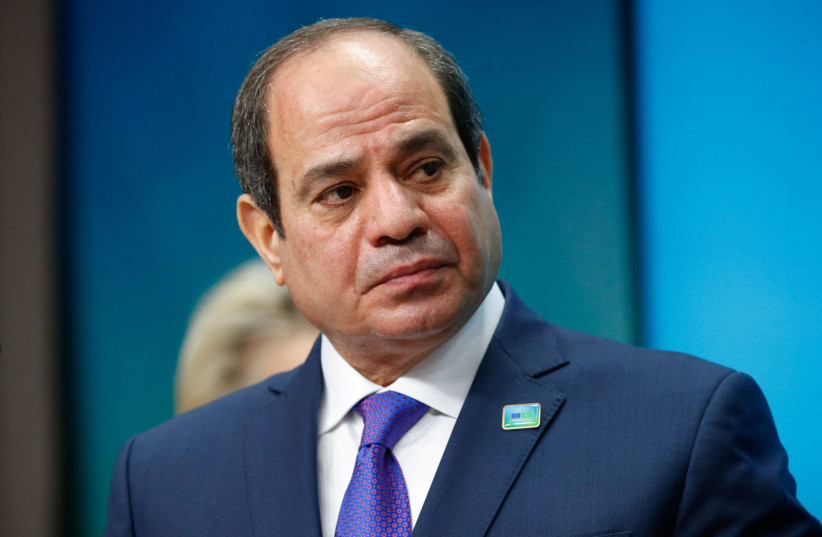The Egyptian pound, which has lost half of its value since March, last week reached a new low of 32 Egyptian pounds against the dollar, with the Central Bank of Egypt shifting to a flexible exchange rate regime. The shift could cause further devaluation of the Egyptian pound and lead to further financial struggle for Egyptians.
For more stories from The Media Line go to themedialine.org
The International Monetary Fund (IMF) approved a $3 billion rescue loan to Egypt in mid-December 2022. The loan came with a set of conditions that aim to push the Egyptian government to create policies that "preserve macroeconomic stability, restore buffers and pave the way for inclusive and private-sector-led growth," said the IMF's statement on the loan.
The IMF's conditions on Egypt include a request to adopt a permanent flexible change rate, meaning that the currency exchange rate is determined by supply and demand and can change accordingly; this is opposed to a fixed exchange rate, where the state aims to maintain a targeted rate of the currency against a base foreign currency.
"Adopting a flexible currency regime would probably mean a further drop in (the value of the) currency, hence higher prices which could risk social unrest as people are finding it difficult to meet their daily needs," Neil Quilliam, managing director at Azure Strategy, told The Media Line.
Can Egyptian military step back from the economy?
Another condition is that the military step back from the economy, which Quilliam believes will not be easy to achieve since military investments have increased very quickly in various sectors of the economy such as pharmaceuticals, construction and food, and they employ their own staff in these enterprises.

He points out that the military is President Abdel Fattah el-Sisi’s “main constituency,” and that “it will be difficult for him to push them back," adding that it is necessary for the military to "back off from the economy" and let the private sector flourish.
Dr. Noha Bakr, a professor of political science in Egypt, says that the Egyptian economy has gotten to this condition due to external and uncontrollable reasons such as the pandemic and the Russo-Ukrainian war.
Egypt had its plan for growth with a clear agenda for 2030 that included fiscal and economic reforms, she told The Media Line.
Bakr added that "pre-COVID and the Ukraine war figures were reflecting growth, a decreased unemployment rate, the revival of the tourism sector, an increase in remittance of the Egyptians working abroad, steady increase in the foreign currency reserves, and attracted foreign investments in the field of energy."
The war in Ukraine caused wheat prices to soar, heavily impacting Egypt, one of the world’s largest grain importers, while the pandemic had already affected the tourism sector and slowed the economy, which led the economy and foreign reserves to suffer.
Quilliam recognizes these factors as causes for the economic deterioration in the country, but says that the country has reached the current situation due to several policies of the Egyptian government.
Economic deterioration in the country has to do with the Egyptian government's investment decisions over the past few years. "Egypt resorted to external borrowing to finance mega infrastructure projects such as roads and bridges, the new capital, and new cities in governorates," he said, referring to New Cairo, and the coastal cities of El Alamein and Mansoura.
In addition, because the military dominates most sectors of the economy, it has precluded foreign direct investment (FDI). "With diminishing foreign reserves and high borrowing bills, and in the absence of incoming foreign exchange earnings, the Egyptian pound dropped dramatically in value," he said.
Quilliam adds that, as a result of all this, Egyptians are struggling to keep up with the cost of living. "Some prices change on a daily basis. Many people resorted to dollars and/or gold to maintain the value of their assets and savings," he said.
Businesses, he added, "were hit by the foreign exchange shortage, as many goods have piled up in ports as the government has been unable to provide the needed foreign currency to release the products." he said adding that this has changed recently as the IMF pushed the government to resolve this issue.
But he notes that businesses are finding it extremely difficult to price products in an environment marked by high uncertainty.
Bakr believes that the government's reforms will help stabilize the situation. "Controlling the parallel market and attracting foreign direct investments and Gulf support are expected to play a role in reaching local currency stability," she said.
She adds that "safety net measures to support unprivileged people are taking place through increasing the minimum wages, distributing masses of food boxes in rural areas, and cutting costs through a clear detailed decree cutting government expenditure and delaying certain projects."
